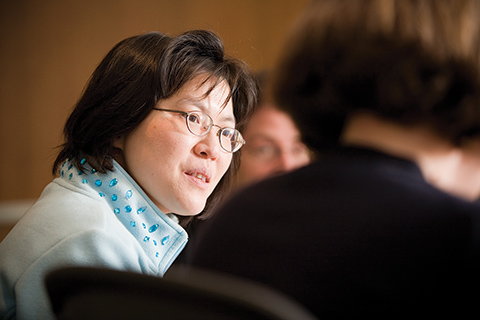-
Using Epidemiology to Identify Unmet Need
When a new renal cell carcinoma treatment faced global reimbursement challenges – because an available on-market drug was considered “standard of care” – Analysis Group undertook an international epidemiological study of patients receiving the existing therapy.
Data from this study quantified an unmet need in renal cell carcinoma patients for more tolerable agents and provided our client with empirical evidence of a significant target market for its therapy.
Led by Managing Principal and Chief Epidemiologist Mei Sheng Duh, M.P.H., Sc.D., the Analysis Group researchers collaborated with clinical experts in eight countries in North America, Europe, and the Asia-Pacific region to study the use of the competitor’s drug in real-world clinical practice. With medical records data from over 600 patients, the researchers found that more than half of the patients discontinued use of the existing drug, often due to intolerance of drug toxicities and related adverse quality-of-life impact. Patients who discontinued the drug due to adverse events averaged two to three adverse events per discontinuation. Globally, more than half of patients taking the drug experienced some type of treatment modification – including discontinuation of therapy, dose reduction, treatment interruption, or treatment switching – due to an adverse event.
This finding illustrated that in real-world practice, physicians manage multiple adverse events per patient taking the drug and may discontinue or modify treatment because of intolerability. In turn, these treatment interruptions negatively affect the effectiveness of the drug in achieving tumor response and prolonging progression-free survival. “This epidemiological study provided our client with information that was not available from clinical trials, administrative claims, or electronic medical record databases,” says Dr. Duh. “Rigorous observational studies of this nature are essential to understand real-world treatment patterns and outcomes of existing therapies, and how new therapies may enter the market due to unmet need.” Data from the study supported Health Technology Assessment submissions in several countries. ■
-
Methodologies in Practice
Extrapolating Results to Other Populations
Challenges:
Health outcomes and epidemiology research across multiple databases is costly. Yet limiting research to one source makes it difficult to compare different populations.Solution: Population Standardization Methods
Methods such as indirect standardization or matching-adjusted indirect comparison can weight a study population so that it mimics the demographic and clinical distributions of a specific target population. In addition, these methods can be repurposed to generalize data to a larger population.Factors used in weighting study data include demographic, social, comorbidity, health resource utilization, and economic information.
-

“For example, data can be generalized to a population with different age distributions or social economic status, or to the entire US population.”— Mei Sheng Duh, Managing Principal and Chief Epidemiologist
From Health Care Bulletin: Fall 2013
